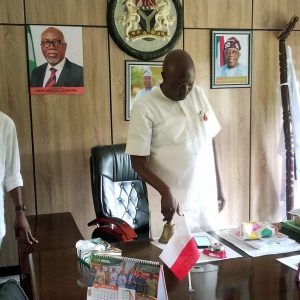The United States and Nigeria have historically maintained a relationship marked by both strategic and symbolic elements. But for the first time in decades, Washington is openly floating threats of aid withdrawal, diplomatic sanctions, and even military action against Africa’s largest democracy. The trigger may be political, but the implications are economic, developmental, and humanitarian. It is also global.
At the heart of the matter is a simple question: What happens when a long-standing partner adopts the language of coercion rather than cooperation? And who stands to lose more if US-Nigeria relations move from strategic engagement to punitive hostility?
A Relationship That Has Evolved Beyond Oil
For decades, the US–Nigeria economic story was a one-commodity affair: oil. Nigeria shipped crude; America sent back refined fuel, machinery and equipment. But the shale revolution changed everything. The US no longer needs Nigerian oil, and that singular shift has redefined the trade equation.
Today, total bilateral trade stands at $8–10 billion annually, a modest figure by global standards. What matters more is the composition:
✅ services, tech, aviation, digital trade
✅ energy majors such as Chevron
✅ partnerships in health, security, and education
The relationship still matters. But it is no longer exclusive. China has overtaken the US in infrastructure. India buys more Nigerian crude. The EU is Nigeria’s largest trading partner. So, when Washington issues threats, it does so in a landscape where Nigeria has alternatives it did not have two decades ago.
In a recent media outing, a journalist lowered his voice and posed a question to me, appearing a bit anxious for reasons I can’t quite decipher: Is Nigeria Dependent on the U.S.?
My response was that it is mixed. In pure trade volume, Nigeria is not dependent on the U.S. In strategic capital, however, it still is.
This infographic offers more clues on where the US is a dominant player in:
So, while Nigeria can replace US crude buyers, it cannot easily replace US credibility capital. That is the reassurance that comes when American companies, donors and universities are engaged.
Half reassured, it would appear, the following query was whether the U.S. threats have a real impact. Again, this is mixed because, while I believe it will, it is unlikely to be where Washington expects. I had to offer further nuances. The loudest shock may be political, but the most profound shock would be financial and strategic.
If US relations are sour:
- Security cooperation stalls – Boko Haram and ISWAP do not wait for diplomatic resets.
- Health and humanitarian aid shrinks – Nigeria is still heavily reliant on foreign support for HIV, malaria and food resilience.
- Private sector capital hesitates – investors do not wait for war; they flee from even the rumour of an impending war.
But we must consider the geopolitical twist: Nigeria will not collapse. Nigeria will realign. Those who thought that the decision by Nigeria to be a BRICS Partner Nation was based on nothing should now think again.
Instead of Chevron, it will deepen ties with Saudi Aramco or Sinopec. Instead of Boeing, it will turn to Airbus or COMAC. Instead of Washington, it will fly more frequently to Beijing, Riyadh, and Ankara.
In a multipolar world, punitive diplomacy rarely yields obedience. Contemporary history tells us that it accelerates diversification. And when I listen to and read one of the apostles of a multipolar world, Professor Jeffrey Sachs, and when I see him associating with some of the key figures in Nigeria, I’m left with little doubt where Nigeria is getting its advice from.
The Hidden Risk: U.S. Companies Could Become the First Casualties
American firms in Nigeria have three significant vulnerabilities if US foreign policy becomes confrontational:
- Market substitution – contracts shift to Chinese, Indian, Turkish, or Gulf firms
- Regulatory retaliation – tax audits, licence delays, local content barriers
- Brand backlash – public perception of U.S. bullying Africa affects consumer trust
This is not theoretical. We saw it in:
France–Mali relations (total expulsion of French firms)
U.S.–South Africa AGOA tensions (shift to BRICS markets)
- Russia sanctions (African governments refused to comply)
In short, coercion shrinks the American footprint faster than African compliance grows.
The Poor Will Pay the Humanitarian Price, Not the Politicians
With over 220 million citizens, 60% under 25, and corruption amid high multidimensional poverty, Nigeria is not a country where aid cuts are symbolic. They are existential. US support currently anchors:
| Programme | Beneficiaries |
| PEPFAR HIV Treatment | 1.6 million Nigerians |
| North-East Stabilisation | IDPs & conflict-survivors |
| Education & Food Aid | Vulnerable school communities |
Cut the funds, and you do not punish the government; you punish a generation. You weaken human capital. You strengthen extreme recruitment. You widen the very governance gaps America claims to be concerned about.
Nigeria Also Needs to Get Its House in Order
None of this absolves Abuja of responsibility. Nigeria must urgently fix:
- Policy inconsistency
- FX and trade barriers
- Diplomatic absenteeism (no US ambassador for years)
- Chronic underinvestment in health and education
- Failure to leverage its global Diaspora, which remits more than US aid by a factor of ten
In fact, this is where my forthcoming book, Economic Diplomacy of the Diaspora, makes a central argument: A nation that ignores its Diaspora weakens its bargaining power on the world stage. The United States has mastered Diaspora power. Nigeria has barely begun.
A Better Road Exists and It Starts with Mutual Respect
The U.S. gains more from a stable, democratic, economically growing Nigeria than from a punished, resentful one. Nigeria gains more from a strategic partnership than from nationalist posturing.
The genuine question is not:
Will the U.S. punish Nigeria?
But:
Will the U.S. choose 20th-century coercion or 21st-century collaboration?
Aid cuts, sanctions and threats are the language of a fading unipolar order. Co-investment, technology exchange, Diaspora diplomacy, and climate-smart development are the grammar of the emerging world. If Washington wants to maintain relevance in Africa’s future, it must speak the language of the continent.
In the final analysis, a hostile U.S.–Nigeria reset is not inevitable. But it is now imaginable.If the U.S. chooses pressure, it risks losing markets, moral ground, and geopolitical influence. On its part, if Nigeria responds with denial, it will sacrifice reforms, credibility, and the welfare of its poorest citizens.The wiser path is what diplomacy was invented for: dialogue without humiliation, partnership without paternalism, and influence without threats. Because when the U.S. tries to corner Africa’s biggest democracy, the winner is not America. It is not Nigeria either.
The winner is China.
Stay ahead with the latest updates!
Join The Podium Media on WhatsApp for real-time news alerts, breaking stories, and exclusive content delivered straight to your phone. Don’t miss a headline — subscribe now!
Chat with Us on WhatsApp







